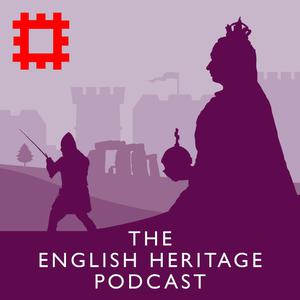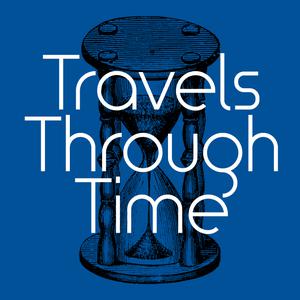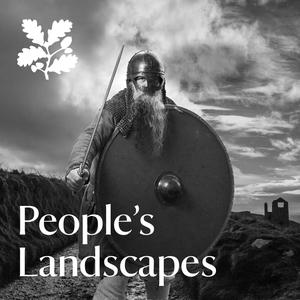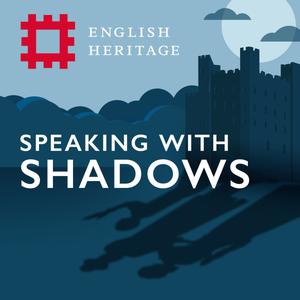
Hidden Histories
Hidden Histories sees Helen Carr exploring some of the country's hidden treasures, as she and some of our finest historians scramble through the actual spaces where history happened. Whether she's visiting the whorehouses of Covent Garden, or...
- 26 minutes 39 secondsSarah Goldsmith on the Grand Tour
Sarah Goldsmith talks about the Grand Tour as a rite of passage for young men. These young men went abroad to learn things about art and architecture. She also discusses the way the Grand Tour intersected with military rites of passage and how some grand tourists ended up at the Battle of Waterloo. To follow Sarah Goldsmith: @S_Goldsmith_
This was produced in partnership with the Arts and Humanities Research Council. Follow their work here: https://twitter.com/ahrcpress
Producer: Peter Curry @petedoeshistory
Hosted on Acast. See acast.com/privacy for more information.
7 May 2021, 9:00 am - 23 minutes 2 secondsJoanne Paul on Anne Dowriche and the French Revolution
Joanne Paul talks to Helen about Anne Dowriche. Dowriche was a 16th century writer, usually classified as a pious writer. Joanne casts her instead as a deeply political writer, and explains how her commentaries on the wars of religion were a rare example of political writing from a Tudor woman. To find out more about Joanne's work, follow her on Twitter: @Joanne_Paul_ Or check out her website: https://www.joannepaul.com/about
This was produced in partnership with the Arts and Humanities Research Council. Follow their work here: https://twitter.com/ahrcpress
Producer: Peter Curry @petedoeshistory
Hosted on Acast. See acast.com/privacy for more information.
6 May 2021, 9:00 am - 36 minutes 42 secondsRachel Hewitt on the History of Women, the Outdoors and the Safety of the Streets
Rachel Hewitt talks to Helen about women in sports and mountaineering, and how that plays into perceptions of women generally, as well as informing current gendered perceptions of who gets to use public spaces. Women are subject to a myriad network of social pressures, many of which are informed by previous perceptions of history. Sports play a large role in constructing such social pressures. As Pierre de Coubertin, the creator of the Olympic Games in their present form, once said: "Sports are not in women's nature."
To follow Dr Rachel Hewitt, follow her on twitter @drrachelhewitt or go to her website: https://rachelhewitt.org/
This was produced in partnership with the Arts and Humanities Research Council. Follow their work here: https://twitter.com/ahrcpress
Producer: Peter Curry @petedoeshistory
Hosted on Acast. See acast.com/privacy for more information.
5 May 2021, 9:00 am - 25 minutes 43 secondsEmily Cock on Disability in the Early Modern Period
Emily Cock talks to Helen about Thomas Fairfax, the Civil War general who used a wheelchair, as well as the history of disability more generally. What did it mean to have facial scars in the 17th century, and how did the Earl of Arlington use a scar on his nose to curry favour with Charles II?
Thomas Fairfax's wheelchair: https://www.culture24.org.uk/history-and-heritage/military-history/pre-20th-century-conflict/art549698-thomas-fairfax-english-civil-war-wheelchair
One of Arise Evans' visions: https://www.exclassics.com/pamphlets/pamph019.htm
Louis XIV in his wheelchair: https://www.gettyimages.co.uk/detail/news-photo/king-louis-xiv-of-france-in-his-wheelchair-in-front-of-the-news-photo/145501029
National Portrait Gallery image of Henry Bennet, 1st Earl of Arlington: https://www.npg.org.uk/collections/search/portrait/mw00179/Henry-Bennet-1st-Earl-of-Arlington?LinkID=mp00134&role=sit&rNo=0
To see what Emily is up to, follow her on twitter: @EmilyNCock
This was produced in partnership with the Arts and Humanities Research Council. Follow their work here: https://twitter.com/ahrcpress
Producer: Peter Curry @petedoeshistory
Hosted on Acast. See acast.com/privacy for more information.
4 May 2021, 9:00 am - 23 minutes 20 secondsLouisa Egbunike on the Nigeria-Biafra War Through the Arts
Louisa Egbunike discusses the history of the Nigeria-Biafra war, and particularly how Nigerians responded to the war through the visual and written arts. To follow more of Louisa's work, follow her on twitter at @LouisaEgbunike. Unfortunately, there were a few connection issues in the recording of this podcast, and the sound may be a little patchy at times. Many apologies if you have any issues!
Below is a list of the visual artists and poets that Louisa discusses to help you in your own research:
Obiora Udechukwu
Uche Okeke
Christopher Okigbo
Flora Nwapa
Buchi Emecheta
Chinua Achebe
Chimamanda Ngozi Adichie
The traditional Igbo art form is called Uli, and the wikipedia can be found here: https://en.wikipedia.org/wiki/Uli_(design)
This was produced in partnership with the Arts and Humanities Research Council. Follow their work here: https://twitter.com/ahrcpress
Producer: Peter Curry @petedoeshistory
Hosted on Acast. See acast.com/privacy for more information.
3 May 2021, 9:00 am - 22 minutes 2 secondsSophie Oliver on Jean Rhys
Sophie Oliver talks to Helen about Jean Rhys, the author of Wide Sargasso Sea, intended as a prequel to Jane Eyre. Sophie talks about how she practices history, and the role of objects in literary history.
To follow Sophie's work: @sophieolive @LivUniEnglish @LivUni
This was produced in partnership with the Arts and Humanities Research Council. Follow their work here: https://twitter.com/ahrcpress
Producer: Peter Curry @petedoeshistory
Hosted on Acast. See acast.com/privacy for more information.
30 April 2021, 9:00 am - 34 minutes 59 secondsJon Healey on the Tumultuous 17th Century
Jon Healey discusses the 17th century in all its twists and folds and manifest complexity. He talks about the Royalists, the Parliamentarians, the Levellers, the Diggers, and the Quakers and what each group stood for and fought for, as well as the Glorious Revolution and tales of drunken cavaliers delivering sermons and placing their genitalia into wine cups.
To follow Jon's work: @SocialHistoryOx @KelloggOx
This was produced in partnership with the Arts and Humanities Research Council. Follow their work here: https://twitter.com/ahrcpress
Producer: Peter Curry @petedoeshistory
Hosted on Acast. See acast.com/privacy for more information.
29 April 2021, 9:00 am - 31 minutes 23 secondsNandini Das on the Early Age of Travel
Nandini Das talks to Helen about the early age of travel in the Elizabethan era. This era saw the beginnings of travel, with the likes of Thomas Coryate creating 'travel wagers' - where he dared others to bet against him circumnavigating Europe. Nandini also reflects on immigration in the Elizabethan era, and she chronicles some of the similarities and differences around discussions of immigration in the Elizabethan era and in the modern era. The culmination of some of these troubles was perhaps a debate in the 1590s about the 'stranger problem' in Parliament, but immigration from abroad was an ever present issue in the Elizabethan age.
To find out more about the Tide Project, go here: http://www.tideproject.uk/
To follow Nandini's work, go here: @rentravailer @ERC_TIDE @ExeterCollegeOx
This was produced in partnership with the Arts and Humanities Research Council. Follow their work here: https://twitter.com/ahrcpress
Producer: Peter Curry @petedoeshistory
Hosted on Acast. See acast.com/privacy for more information.
28 April 2021, 9:00 am - 27 minutes 6 secondsDavid Petts on the Holy Island of Lindisfarne
David Petts talks about Lindisfarne, the Holy Island. He talks about how St Cuthbert ended up as patron saint of the island, and how the practice of early Christians there. Since Lindisfarne is a tidal island, the coming and going of the tides was often compared with the parting of the Red Sea, and the sea itself was seen as a channel to God. To follow David's work, go here: @DavidPetts1 For the DigVentures site, go here: https://digventures.com/lindisfarne/about/
This was produced in partnership with the Arts and Humanities Research Council. Follow their work here: https://twitter.com/ahrcpress
Producer: Peter Curry @petedoeshistory
Hosted on Acast. See acast.com/privacy for more information.
27 April 2021, 9:00 am - 34 minutes 58 secondsEmma Butcher on Children And Warfare In The 18th To The 21st Century
Emma Butcher talks to Helen about her work on children in warfare. They talk about why children enlisted, and what they did on the battlefield. They discuss the likes of Joseph Bara and Marjorie Fleming, as well as the many magical worlds created by the Bronte sisters. To find more of Emma's work, follow @EmmaButcher_ or see her website: https://www.emmabutcher.net/about
This was produced in partnership with the Arts and Humanities Research Council. Follow their work here: https://twitter.com/ahrcpress
Producer: Peter Curry @petedoeshistory
Hosted on Acast. See acast.com/privacy for more information.
26 April 2021, 9:00 am - 27 minutes 18 secondsSeb Falk on The Light Ages
Were the Dark Ages really that dark? Seb Falk argues that science and religion weren't at odds with each other in the medieval era, but two sides of the same coin. His main story focuses on the life of John Westwyk, a medieval monk, and through John's eyes we understand how the medieval man or woman might have viewed the world.
He talks about the medieval equivalent of the smartphone, the legendary story about trying to steal the testicles and anal glands of beavers, and how to attract a unicorn with nothing but a virgin and a forest glade.
Seb Falk is a historian, teacher, broadcaster and historical consultant. Find out more about Seb and his work here: https://www.sebfalk.com/about-seb
Hosted on Acast. See acast.com/privacy for more information.
4 December 2020, 10:00 am - More Episodes? Get the App
Your feedback is valuable to us. Should you encounter any bugs, glitches, lack of functionality or other problems, please email us on [email protected] or join Moon.FM Telegram Group where you can talk directly to the dev team who are happy to answer any queries.
 The English Heritage Podcast
The English Heritage Podcast
 Irreplaceable: A History of England in 100 Places
Irreplaceable: A History of England in 100 Places
 Travels Through Time
Travels Through Time
 Bunk Bed
Bunk Bed
 People's Landscapes
People's Landscapes
 Speaking with Shadows
Speaking with Shadows